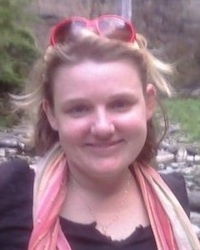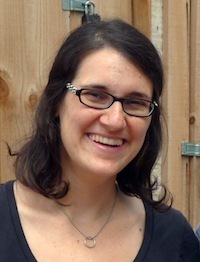Humanities fellows step into ‘real world’
With “To the Best of Our Knowledge,” Wisconsin Public Radio has the chance to explore big ideas and big issues in depth. That’s why Stephanie Youngblood, a doctoral candidate in English and one of the first cohort of Public Humanities Fellows at UW–Madison, is a perfect fit, says Steve Paulson, the program’s executive producer.
“Having someone getting her Ph.D. in literary scholarship will add depth and bring another dimension that will help us explore ideas we wouldn’t do otherwise,” he said.
Thanks to a $1.1 million grant from the Andrew W. Mellon Foundation, Youngblood and four other fellows started their jobs at Madison community organizations when the fall semester began this month. The Center for the Humanities has worked with local institutions to create opportunities for graduate students and faculty in the humanities to contribute to civic life and explore career opportunities outside academia.
For students such as Youngblood and Anna Zeide, who will work at the Madison Children’s Museum, the fellowships suggest new career paths. “When you start a doctorate in the humanities, you tend to think you’ll stay at the university level teaching and writing,” Youngblood said. “This program lets humanities fellows see how they can engage with the world and not leave research behind.”
The first cohort of Public Humanities Fellows and their host institutions are:
- Gabriella Ekman (English), Center for the Humanities — Great World Texts in Wisconsin
- Heather Dubois-Bourennane (African Languages and Literature), Center for the Humanities — Great World Texts
- Kelly Hiser (Music), Madison Public Libraries-Digital Publishing
- Anna Zeide (History of Science, Technology, and Medicine), Madison Children’s Museum
- Stephanie Youngblood (English), Wisconsin Public Radio — “To The Best of Our Knowledge”
“These fellowships, which are at the cutting edge of thinking about the future of the humanities Ph.D., demonstrate the range of careers for which advanced training — undertaking extensive research, writing a dissertation, and thinking against the grain — is preparation,” says Sara Guyer, director of the Center for Humanities.
“Academic research is great because you get to delve into a very specific topic,” Youngblood says. Her doctoral research, for example, examines how and why American poetry responded to social crises such as the AIDS crisis and the terrorist attacks of September 11, 2001.

Stephanie Youngblood
Students, however, choose the humanities because they are generally interested in how language relates to the world and how people make stories about the world, Youngblood adds. The fellowship brings the two together, allowing her to use research to introduce information about a general theme and bring specifics to a wider audience.
At the radio station, Youngblood may develop a flash fiction contest inviting listeners to write very short science fiction stories, an area in which she has a personal interest. She also will research subjects for longer segments of “To The Best of Our Knowledge.” Paulson welcomes what he calls a mix of cultures. “What we want to do is build a bridge between the scholarly world and the world of radio listeners,” he says.
With the radio fellowship, Youngblood says she feels like she’s using her mind, skills and education without needing to make an argument for a very specific topic. The work isn’t about reducing scholarly complexity but in making scholarly research accessible, she said.
“To be interesting, clear and coherent to large numbers of people may be what the humanities need,” she said. “This fellowship is exciting, regardless of where it all takes me.”
Even on a weekday, the Madison Children’s Museum buzzes with activity as children carefully hold fluffy, live chicks; climb the Hodgepodge Mahal, and learn the physics of motion by running in the Gerbil Wheel. Humanities fellow Anna Zeide will focus on exhibit development, content research, writing, exhibit development and community programming during her tenure here.

Anna Zeide
“We’re excited with the opportunity to have such a high-caliber in-house scholar working with us on content development,” says Brenda Baker, the museum’s director of exhibits. “Having an outside set of eyes to reframe things will offer us new opportunities to connect with our audience.”
The museum, known nationally for its sustainability and cultural initiatives, needs solid research to develop exhibits and write grants, Baker says. She also anticipates Zeide will help develop KidShare, a new project that helps children use digital media to develop a sense of place, and Designed to Move, which will redesign the stairwells to encourage visitors to walk instead of taking the elevator. “The humanities are an essential element for a solid early childhood education,” Baker says. “We’re thrilled with this opportunity.”
The museum fellowship falls at the intersection of Zeide’s diverse interests, from history, environment and culture to sense of place and community engagement. “It feels like a really interesting synthesis of things I’ve been compelled by,” she says.
Holding on to diverse interests is not easy in graduate school, where students are expected to pursue jobs in academia, Zeide says. Everything else is Plan B, and there’s no preparation for it. Zeide’s dissertation explores the history of the canning industry to understand the roots of the processed food system in the United States. She’s developed her interested in public humanities through her work with the Nelson Institute’s Center for Culture, History, and Environment, where she led Place-Based Workshops.
The fellowship offers an ideal foundation whether Zeide pursues a career in academia, museums or the nonprofit world. “This is about re-embracing the Wisconsin Idea,” she says, referring to the notion that the university is meant to work with community and world partners to address contemporary issues. “These are partnerships that make sense.”
Guyer applauds the support of the Mellon Foundation and the energy of the Madison organization who will mentor the fellows. “They allow the Center for the Humanities to implement this program, simultaneously invigorating graduate scholarship at UW and community life in Madison,” she said. “My hope is that in the future it will not just be cultural non-profits that recognize the value of the humanities Ph.D. and host our students, but also the private sector.”
Tags: humanities



